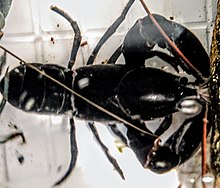Cherax preissii
| Cherax preissii | |
|---|---|

| |
| Scientific classification | |
| Domain: | Eukaryota |
| Kingdom: | Animalia |
| Phylum: | Arthropoda |
| Class: | Malacostraca |
| Order: | Decapoda |
| Suborder: | Pleocyemata |
| Family: | Parastacidae |
| Genus: | Cherax |
| Species: | C. preissii
|
| Binomial name | |
| Cherax preissii Erichson, 1846
| |
Cherax preissii, the common koonac, is a Western Australian freshwater crustacean in the Parastacidae family.
Its common name of "koonac" is also applied to another Western Australian Cherax species of crustacean C. glaber, the "glossy koonac", which is restricted to a much smaller region of WA.[2][3]
Koonacs can grow up to 20 cm and may be coloured black and red, dark brown, or bluish black. They have broad, serrated claws and four keels on the head, two of which are prominent.[4][5]
Ecology
[edit]Koonacs are endemic to the southwest of Western Australia, in wetlands, permanent and seasonal waterways, and farm dams. They are able to survive seasonal dryness for several months by digging burrows.[6]
Although they are rated as "least concern" on the IUCN redlist, local populations may be under threat by introduced eastern states yabbies such as Cherax destructor and Cherax albidus through competition for food and habitat.[1][7]
Catching
[edit]Although catching koonacs is not seasonally restricted, fishing for marron is. The rules for fishing marron should be taken into account when fishing for koonacs, as this might involve the use of equipment (e.g. traps) that is illegal in marron-inhabited areas.[8]
References
[edit]- ^ a b Austin, C.M. (2010). "Cherax preissii". IUCN Red List of Threatened Species. 2010: e.T153690A4532362. doi:10.2305/IUCN.UK.2010-3.RLTS.T153690A4532362.en. Retrieved 12 November 2021.
- ^ Munasinghe, D. H. N.; Burridge, C. P.; Austin, C. M. (2004). "Molecular phylogeny and zoogeography of the freshwater crayfish genus Cherax Erichson (Decapoda: Parastacidae) in Australia". Biological Journal of the Linnean Society. 81: 553–563. doi:10.1111/j.1095-8312.2003.00299.x. hdl:10536/DRO/DU:30002613.
- ^ "Fish and freshwater crayfish in streams in the Cape Naturaliste region & Wilyabrup Brook. Report to the Cape to Cape Catchments Group and GeoCatch" (PDF). Beatty, S., Morgan, D., Jury, C. & Mitchell, J. (2006)
- ^ "Koonac". Wetlands.newtonmooreshs.wa.edu.au. Retrieved 26 October 2017.
- ^ "Identifying Freshwater Crayfish - Department of Fisheries, Western Australia, Fish for the Future". Web.archive.gov. 24 January 2010. Archived from the original on 24 January 2010. Retrieved 26 October 2017.
- ^ "Identifying Freshwater Crayfish" (PDF). Fish.wa.gov.au. Retrieved 26 October 2017.
- ^ Lynas J., Storey A., Knott B. (2007) Introduction and spread of crayfish (Parastacidae) in Western Australia and their potential to displace indigenous species. In: Gherardi F. (eds) Biological invaders in inland waters: Profiles, distribution, and threats. Invading Nature - Springer Series In Invasion Ecology, vol 2. Springer, Dordrecht
- ^ "Recreational fishing for marron guide 2017" (PDF). Dept. Of Fisheries W.A. 2016.

